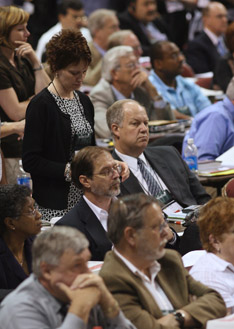
|
||||||||
| Mainline Clergy Divided on Gay, Lesbian Issues | |||||||
|
WASHINGTON – A quarter of United Methodist clergy support same-sex marriages and less than a third back gay and lesbian clergy, a study has found. In a survey of clergy from seven mainline denominations, senior United Methodist clergy were among the strongest advocates of traditional church policies on marriage and ordination, ranking below only their colleagues from American Baptist Churches in the U.S.A. The 2008 Mainline Protestant Clergy Voices Survey, conducted by Washington-based Public Religion Research, found substantial support for same-sex marriages and homosexual clergy in the Episcopal Church and United Church of Christ, while the Christian Church (Disciples of Christ), Evangelical Lutheran Church in America and the Presbyterian Church (U.S.A.) are divided on gay and lesbian issues. The random survey of 2,658 senior clergy from the seven denominations has an overall margin of error of plus or minus 2 percent, according to the recently released report. "United Methodist clergy are supportive of some rights for gay and lesbian Americans," said Robert P. Jones, president of Public Religion Research, which conducted the survey. "Strong majorities of United Methodist clergy support hate crimes laws and workplace protections, and a plurality support adoption rights. On the other hand, United Methodist clergy are evenly split on legal rights for same-sex couples, with 51 percent supporting either marriage or civil unions." The study found there are significant "and sometimes stark differences" across denominational lines on gay and lesbian issues. United Methodists and American Baptist clergy were found to be generally less supportive on issues relating to marriage and ordination "rights," the study said. While two-thirds of United Church of Christ clergy support same-sex marriage, only one in four United Methodist respondents favored the practice. Seventy-two percent of Episcopal clergy backed the ordination of gays and lesbians, compared to 32 percent of United Methodist pastors. Eighty percent of Evangelical Lutheran clergy support gays and lesbians as lay leaders, compared to 51 percent of United Methodist leaders. "United Methodist clergy are more highly concentrated in the South, 47 percent vs. 32 percent of all mainline clergy," Jones said. "The South is the most socially, politically and culturally conservative area of the country. Clergy, like all Americans, are influenced by their regional cultures." There were some areas of strong agreement. Nearly all mainline clergy said gays and lesbians are welcome in their churches, and 79 percent, including 69 percent of United Methodists, said homosexuals should have all the same rights and privileges as other Americans. Ninety-two percent of clergy said they would be responsive to congregation requests for more conversation on gay and lesbian issues, and less than one in 10 said the best approach is "don't ask, don't tell." However, respondents were evenly divided on the question of whether their congregation risks losing members by talking too much about homosexuality. Fifty-five percent said their congregation has difficulty talking about gay and lesbian issues. No matter where they stand, a large number of Protestant clergy, just more than half, believe homosexuality is a crisis in the church. Differences in the Episcopal Church have led to major defections and a rift in the Anglican Communion. The United Methodist Church has consistently affirmed that marriage is between a man and a woman. The 2008 General Conference, the denomination's top lawmaking body, also voted to keep language in its law book that states, "The United Methodist Church does not condone the practice of homosexuality and consider this practice incompatible with Christian teaching." In the survey, a majority of United Methodist clergy, 57 percent, said they adopt a "love the sinner, hate the sin," approach to distinguish between negative attitudes about homosexuality and the treatment of homosexual persons. Thirty-four percent of United Methodist clergy strongly agreed the gospel message requires full inclusion of gays and lesbians, compared to 16 percent who strongly disagreed with the statement. "One key element to realize is that, like all Americans and other mainline clergy, United Methodist clergy attitudes are moving in a more open and affirming direction on gay and lesbian issues," Jones said. "Forty-one percent of United Methodist clergy report their views have become more liberal on lesbian and gay issues over the last 10 years, versus only 15 percent who report their views have become more conservative." |
|
||||||
 |
Last
Updated
July 6, 2009




